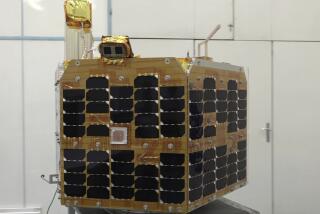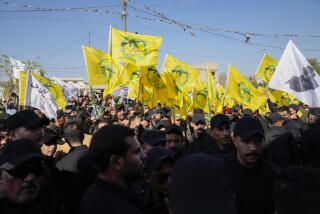Iran’s $12-billion enforcers
- Share via
LONDON — Iran’s Revolutionary Guard has quietly become one of the most significant political and economic powers in the Islamic Republic, with ties to more than 100 companies, which by some estimates control more than $12 billion in business and construction, economists and Iranian political analysts say.
The Guard was created in 1979 as a military and intelligence force to protect the ideals of Iran’s Islamic Revolution. But the 125,000-strong force has used the massive military engineering capability it developed rebuilding the country after the 1980-88 war with Iraq to take over the strategic highlands of the Iranian economy.
The legendary people’s army now has its hand in a broad and diverse variety of activities, such as dentistry and travel, and has become the dominant player in public construction projects across the country, say businessmen and economists in Tehran and analysts abroad.
Under the leadership of President Mahmoud Ahmadinejad, a former Revolutionary Guard commander, the force also has extended its reach in the Cabinet: 14 of 21 members are former Guard commanders. Former officers also hold 80 of the 290 seats in the parliament and a host of local mayorships and local council seats. Iran’s chief nuclear negotiator, Ali Larijani, is a former Guardsman.
The Revolutionary Guard’s growing economic clout helps explain why the Bush administration is reportedly contemplating designating it a terrorist organization: More important than the label itself, the move would allow the U.S. to block its assets and disrupt operations by firms that associate with it, which with the Guard’s large financial footprint would affect supplies, credit and investment to a broad swath of the Iranian economy.
With billions of dollars in revenues at the Guard’s disposal, analysts say, the organization that has been the ideological heart of the Islamic Revolution has developed an expanded capability to finance and mount covert military operations well outside the public eye.
“Now, all the money that’s coming in serves to make them the most powerful force in Iran. They have a massive hand in the economic sector,” said Robin Hughes, deputy editor of the London-based Jane’s Defense Weekly. “And what’s important about that is there is no oversight body that exists that has the capability to supervise the IRGC’s economic activities,” he said, using initials of its formal name, the Islamic Revolutionary Guard Corps.
Across Iran, public works projects involving pipelines, roads, bridges and, increasingly, oil and gas are dominated by the Guard’s engineering arm, the equivalent of the U.S. Army Corps of Engineers, or by companies with which the Guard has a close relationship.
“The amount of money we’re talking about is $12 billion to $15 billion in contracts. Unbelievable,” said a Tehran-based economist who spoke on condition of anonymity for security reasons. “Basically, the private sector has no more space for doing civil projects in the country, or very few of them. All the projects are being done by special companies which belong to the Revolutionary Guards.”
Iranian officials have disclosed an estimated $6 billion in contracts the Revolutionary Guard has received over the years -- a figure equivalent to one-tenth of Iran’s annual exports of $66.7 billion, mainly oil. The nation’s annual gross domestic product is about $204 billion, unadjusted for cost of living.
Even in cases where the Guard does not assert direct ownership of companies, there often are important below-the-radar links, said Mahan Abedin, an Iranian native who is research director for the Center for the Study of Terrorism in London.
“The people who do the really tough jobs on these big construction projects, because they design a lot of them, are part of the Revolutionary Guards. But that ownership is never stated,” Abedin said. “There is a very complex commercial structure in place. They will always hide that link.
“Back in the ‘80s, it was a very pure force, ideologically. Very Islamic. But now the whole thing is about making money.”
The Revolutionary Guard plays a unique role in Iranian society. It was envisioned as a people’s army that would provide a counterweight to the regular military and protect the late Ayatollah Ruhollah Khomeini’s Islamic Revolution against the threat of foreign-sponsored coups, and today it remains a bastion of Islamic ideology.
Its troops are organized in parallel to the Iranian military, complete with an officers’ academy and independent naval, air and ground components. It also runs a large and widely feared domestic and foreign intelligence service, and reports directly to the supreme leader of Iran’s Shiite regime.
The Guard has mobilized its equipment stockpiles, wartime medical know-how, weapons-building capability and cheap military labor to become the contractor of choice on many government projects.
“The IRGC is so deeply entrenched in Iran’s economy and commercial enterprises, it is increasingly likely that if you are doing business with Iran, you are somehow doing business with the IRGC,” Henry Paulson, U.S. Treasury secretary, said in a speech last month.
No oversight
Crucially important to U.S. officials weighing the possibility of sanctions is that the Guard presides over a multibillion- dollar income stream outside the scrutiny of Iran’s parliament or the national budgeting process, according to many of those familiar with the Guard’s operations.
Such a cash flow, Iranian opposition leaders and some analysts have argued, could be marshaled to finance clandestine military operations, such as support to Iraq’s Shiite militias, weapons for Lebanon’s Hezbollah fighters or clandestine nuclear development programs.
The controversial uranium enrichment facility at Natanz, which came to light in 2002, was developed under close supervision by the Revolutionary Guard without disclosure under the parliament’s public budgeting process. Since then, U.S. officials have attempted to impose a series of sanctions to halt financing of Iran’s nuclear and missile development programs.
“They don’t answer to anybody. Because they have the power. They have the guns,” said Mohsen Sazegara, a co-founder of the Guard who helped draft its original charter, but who has gone into exile in the U.S. “And when there is no free media to criticize them, naturally they start to become corrupt, to start to do whatever they want. This is now the situation.”
Revolutionary Guard leaders have said they are using their expertise and equipment for the good of the nation, and are not only providing employment, but generating work for companies that subcontract with the organization. Many Iranians have argued that it is better to have Guard engineering firms in charge of strategic sectors of the economy than relying on foreign firms.
“The IRGC considers itself responsible for the defense of the Islamic Revolution, its achievements, and the ideology and values of Imam Khomeini,” the chief commander, Yahya Rahim Safavi, wrote in a letter to the parliament in 2003. “Our main mission is to stop those who wish to destroy and overthrow the Islamic Revolution.”
Last year, the Guard’s main engineering firm, Khatam al Anbia, was awarded a contract to construct a $1.3-billion, 560-mile gas pipeline to the Pakistan border. It is also the lead contractor for development of a portion of Iran’s massive South Pars gas field, a project worth $2.3 billion, beating out more experienced foreign oil and gas contractors. And Guard interests are also thought to be in control of the transport of oil from Kazakhstan through Iran.
The Guard also won two contracts potentially worth $2 billion for expansion of Tehran’s subway system and is linked to a company that assembles up to 50,000 Mazda cars a year in Iran.
Chances are, Iranians who go in for laser eye surgery are being treated by the employees of the Revolutionary Guard, which operates a major hospital in Tehran and several dental and eye clinics.
In 2004, the much-heralded new Imam Khomeini International Airport just south of Tehran, run by a Turkish-Austrian consortium, had been open only a few hours when it was ordered closed by the Guard, citing “security” concerns.
Several analysts said the closure was widely believed to be an attempt by the Guard to protect its oversight of air shipments to and from the Iranian capital. It is now under Guard control, out of the prying eyes of outsiders.
Iranian analysts say that some elements of the Guard have leveraged its control of Iran’s borders into an informal relationship with gangs that smuggle in alcohol, cigarettes and satellite dishes from Iraq.
No competition
Many of Iran’s businessmen say it is impossible to compete against companies that not only have the inside track in government contracting but the armed force of the law behind them.
A businessman who would allow only his first name, Ali, to be published said his company lost out in bids for overhauling an oil terminal in the port of Mah Shahr and expansion of the port in Chabahar after a Guard-affiliated company bid was one-third less and won the contract.
“How can we compete?” he said. “Why can they offer such an inexpensive price for a civil project like this? A, they have access to cheap assets and equipment owned by the IRGC. B, for unskilled workers they can use the drafted soldier, though we have to pay. C, they are confident that once they win the tender, they can ignore the overruns.”
Reports that the Bush administration may designate the Guard a terrorist organization have drawn widespread condemnation across Iran.
Many analysts have said the idea of designating a national army as a terrorist group dooms any hope of cooperation between the U.S. and Iran on security in Iraq. The public, though mindful of some corruption in the Guard ranks, largely sees the organization as a source of national pride and a guardian of Iran’s aspirations as a force to be reckoned with in the Middle East.
But Sazegara said the organization’s economic role is a breach of the original mission he helped craft for it as an associate of Khomeini: to act as a people’s army, a protector of revolutionary ideals and an obstacle against any coup attempt by the regular army.
He said the main force behind the Guard’s movement into the economy was a mandate by former President Hashemi Rafsanjani for all government departments to begin generating some of their own revenues.
“This was not a bad idea. But you know, you have to control such an idea. Especially when you allow the security forces and military forces to get involved in creating income,” said Sazegara, who is now a research fellow at Harvard University.
Sazegara and others said some commanders, current and former, have become wealthy with the organization’s moneymaking enterprises. But the majority are considered uncorrupted, and have resisted efforts to engage in businesses not advancing the Guard’s revolutionary aims, they said.
“The main body of the Revolutionary Guard and the majority of the commanders, they don’t like this situation. They don’t want to be corrupted. They don’t want to be involved in politics,” Sazegara said.
“The IRGC can never be allowed to get too corrupt, because that would endanger the system as a whole,” Abedin, the London-based terrorism expert. “It still is seen as a prime ideological force, the strong arm of the Islamic Revolution. So its ideological health is very, very important to key people in the regime, and they watch it very, very carefully.”
Times staff writer Bob Drogin in Washington contributed to this report.
More to Read
Sign up for Essential California
The most important California stories and recommendations in your inbox every morning.
You may occasionally receive promotional content from the Los Angeles Times.









